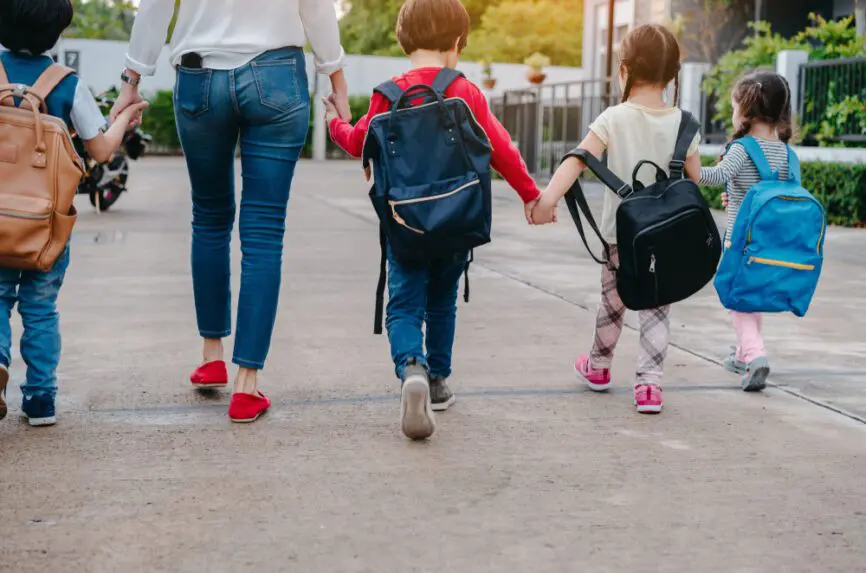Bioethics Forum Essay
Back to School: The Covid Vaccination Choice
It’s back-to-school season in the United States, the third one during the Covid pandemic, but the first in which all schoolchildren are eligible for Covid vaccines. Yet fewer than a third of children ages 5 to 11 are fully vaccinated, while the percentage of those under 5 who have started–let alone completed–vaccination is in the low single digits.
With some cities and states where school has already started experiencing an increase in Covid cases among students and in Covid hospitalizations, is it ethical for parents to not vaccinate their kids? Is this the right question to ask about parents who, until recently, have had no choice at all to vaccinate their youngest children? The answers are complicated.
Vaccines for the littlest kids only became available in June. And with two doses required for the Moderna vaccine and three doses for the Pfizer vaccine, these children need weeks to months between initiating and completing vaccination.
Still, it’s striking that while some parents are eager to vaccinate their young children–and advocated for quicker Food and Drug Administration review and authorization of pediatric vaccines, crowdsourced vaccination sites to facilitate making appointments, and enrolled their children in clinical trials for a (literal) shot at early vaccination–most families are not vaccinating their youngest kids.
Some parents are clearly against Covid vaccination. A July Kaiser Family Foundation survey found 43% of parents will “definitely not” vaccinate their children under 5, and 13% will do so “only if required.” But another survey, conducted earlier this year, indicated that half of parents with young children were either certain or likely to vaccinate, though only 20% planned to do so within three months of eligibility. Some parents open to vaccination are just not early adopters.
Like with adult vaccination, pediatric uptake may also reveal structural barriers to vaccine access. A key strategy for the under 5’s vaccine rollout is offering vaccines in pediatrician’s offices. But many children in the U.S. don’t have a regular primary care provider. Parents may be unable to take time off work during vaccine clinic hours, and most pharmacies cannot vaccinate children under age 3.
However, pediatrician Aaron E. Carroll recently wrote that the low vaccination rate for young children “suggests a lack of urgency” and confusing messaging. To address “the abysmal Covid vaccination rate for toddlers,” Dr. Carroll suggested that messaging focused “on the collective benefits instead of individual risks might yield better results.”
As a scholar researching shared and collective responsibility, I want Dr. Carroll to be right. But as a close observer of the pediatric Covid vaccine process, and as a parent during the pandemic, I am not so sure.
Fueled by analyses, some of which have sparked controversy, about the risks of Covid and its mitigation strategies for kids, some parents voice frustration about kids “sacrificing” experiences–in-person learning, playdates, interacting unmasked–for the collective benefit. Experts counter that minimizing Covid risks ignores their inequitable distribution on individual kids and their communities. Yet an individual choice approach seems to be winning over a collective benefit spirit.
The Centers for Disease Control and Prevention’s revised Covid guidance focusing on individual decisions reflected this thinking. So did the discussion of the FDA’s expert committee of outside advisors when they met in mid-June to review Pfizer and Moderna data on vaccines for the youngest children.
The advisors, like many parents, were split over how risky Covid-19 is to kids. Perhaps because of this, deference to parental choice permeated the unanimous authorization of both vaccines, so parents could choose to vaccinate their child, and choose between the two vaccine manufacturers.
In a subsequent press conference, FDA committee member Peter Marks noted the collective benefits of vaccination and the need to increase vaccination rates. Yet FDA Commissioner Robert Califf focused on individual choice, saying, “we know in America people still want to have a choice, and they have one.”
This message might cater to pernicious “parental choice” rhetoric on issues ranging from school curriculum to routine childhood vaccines. But it might also be a nod to how very few real choices parents feel they have had during the pandemic and a recognition that now, finally, they get to choose.
Parents have been without choices in ways that are frustrating and exhausting at best, and economically and physically perilous at worst. Some parents wanted in-person school. Others wanted to keep their kids home. Many couldn’t access the option they preferred, or saw no good option. Without viable choices for child care or flexible work, parents, especially mothers, simply left the workforce.
Addressing a global pandemic, like so many urgent issues, requires individual contributions toward a collective response. But I can see how, after more than two years of parents being adrift without real, substantive choices, emphasizing parental choice to vaccinate young children might seem, to some, like a long-awaited win.
Yet for others, especially given the guilt or blame parents face for what choices they make within their limited options and individual circumstances, the choice to vaccinate is not one some parents are ready to make, or believe they need to.
Elizabeth Lanphier, PhD, MS (@EthicsElizabeth), is an assistant professor in the Ethics Center at Cincinnati Children’s Hospital Medical Center and in the departments of pediatrics and philosophy at the University of Cincinnati, as well as a nonresident research fellow in the Institute for Philosophy and Public Policy.














Thanks for mentioning that the FDA endorses vaccinations for kids. My daughter is turning 5, and she’s supposed to be vaccinated to go to school. I don’t know much about the vaccines, but I think it would be good for her to get them. https://mrpcare.com/immunizations-2/